Nissan bosses have delivered a vote of confidence in UK car making by announcing that the Sunderland plant will become the hub for production of core models for Europe – securing thousands of jobs in the North East – after confirming the closure of two other factories.
The Japanese firm will close plants in Spain and Indonesia, as it sank into the red for the first time in 11 years after the coronavirus pandemic sent global demand plunging and halted production. Workers have been protesting outside the factory in Barcelona on Thursday.
Nissan’s chief executive Makoto Uchida said production in Europe will be centered at the British plant, as the brand reduces its global production and number of model offerings by 20 per cent by 2023.
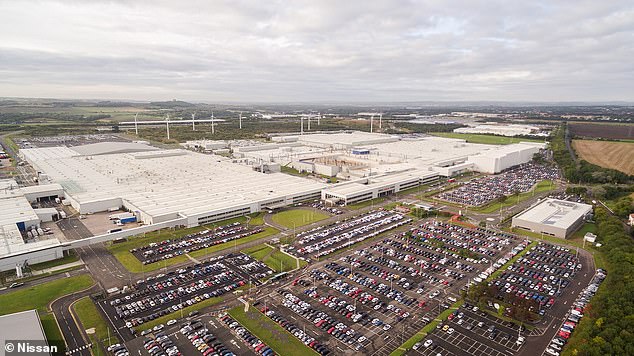

Safety net for Sunderland: Nissan bosses on Thursday announced the closure of its car factory in Spain with core model production now due to be centred at the UK plant
Reports emerged earlier this month that some Renault models – namely the Captur and Kadjar SUVs – that are currently built in other countries could be shifted to Sunderland as bosses look to improve efficiency between the alliance.
Renault owns just over 40 per cent of Nissan’s shares, and the two companies operate a strategic alliance of their respective production facilities.
Stephen Ma, Nissan chief finance officer, said: ‘In western Europe, we will maintain production of core models in Sunderland and maintain efficiency.’
The positive news for Sunderland follows a time of uncertainty for the North East factory, which has been under threat in recent years.
This was accelerated by an announcement in February 2019 that plans to manufacture the next-generation X-Trail SUV at Sunderland had been scrapped in favour of production in Japan.
The UK factory, which is the biggest single car-making facility in the country and employs around 6,000 workers, currently makes the Qashqai and Juke SUVs and the Leaf electric model. It also produces a small output of Infinti models.
It is the second largest vehicle producer in Britain behind Jaguar Land Rover, churning out 346,535 new cars in 2019. That was a decline in outputs of 22 per cent on the year previous.
As well as being a boost to workers, the news will be welcomed by British motorists following the news that 10 per cent import tariffs will be introduced for new cars built in Europe and shipped to the UK from 2021 under Brexit proposals.
This is likely to make home-built cars more affordable, with EU car makers expected to pass the new tariff costs onto consumers – making vehicles on average £1,500 more expensive – rather than absorb them.
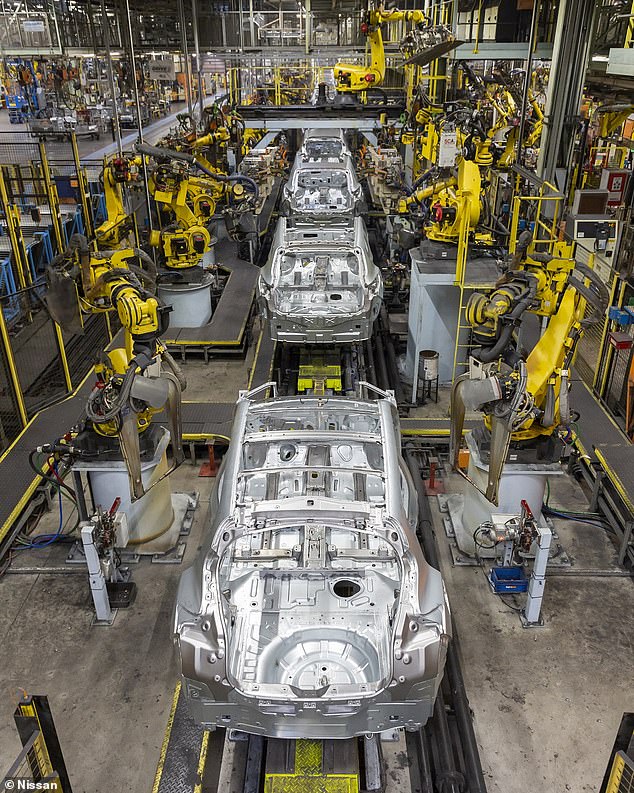

The Sunderland factory is the biggest single car-making facility in the country and employs around 6,000 workers
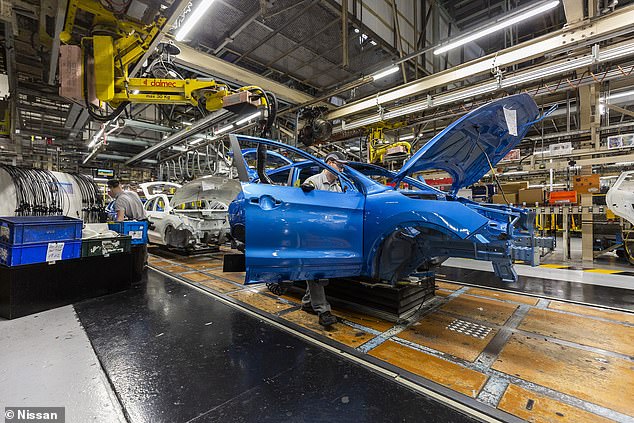

Nissan is the second largest vehicle producer in Britain behind Jaguar Land Rover, churning out 346,535 new cars in Sunderland in 2019. That was a decline in outputs of 22% on the year previous
The plant has been closed since the middle of March due to the Covid-19 pandemic and will not be restarting production until next month.
The phased return of manufacturing in Sunderland will start on Monday 8 June, which is over a month after Rolls-Royce become the first UK car maker to resume outputs on May 4.
David Leggett, automotive analyst at GlobalData, said: ‘Loss-making Nissan had no real alternative but to cut costs wherever it could. The closure of the troubled Barcelona plant was widely expected, but the company is also taking serious action to reduce cost elsewhere including closing a plant in Indonesia.
‘The new focus on core markets and products also makes sense, along with greater leveraging of the alliance with Renault in Europe – again, a move that should reduce costs.
‘Concentrating on vehicle segments where Nissan is strong – especially electric vehicles, but also SUVs – was a no-brainer for a management team now embarking on a post-Carlos Ghosn strategic path.’
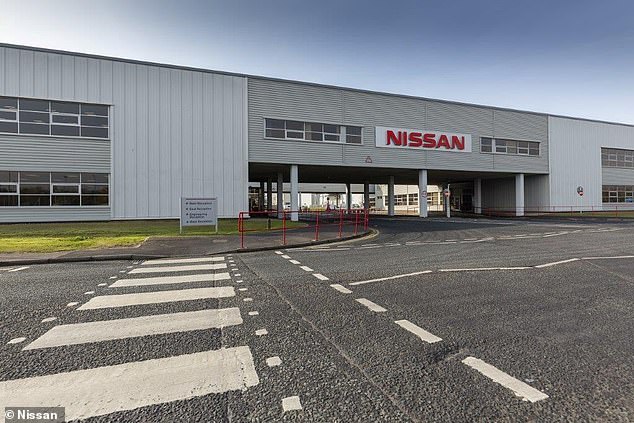

The phased return of manufacturing in Sunderland will start on Monday 8 June, which is over a month after Rolls-Royce become the first UK car maker to resume outputs on May 4
An announcement yesterday by the Renault Nissan Mitsubishi alliance confirmed changes were afoot.
It set out a new ‘leader-follower’ scheme designed to enhance efficiency between the three companies by increasing shared production and development as well as designating key markets to the specific brands.
Each firm will become the lead ‘reference’ brand in key regions and of key technologies, with Renault spearheading the European market and development of next-generation compact SUVs.
Nissan will become the lead firm in Japan, North America and China and will develop the next-generation Nissan Qashqai-based C-segment SUV, which is due in 2025.
It’s expected that Nissan will reduce its focus on lower-margin segments such as superminis, which could spell the end of the once-popular Micra.
The alliance hopes this will ensure its remaining factories can work at 100 per cent capacity.
Bosses said that Europe remains ‘an important region for Nissan’, but the firm acknowledges that market conditions are tough, with a combination of high regulation and competition.
The brand is on track to introduce more than eight new electric vehicles globally by 2023 as, like other car manufacturers, it shifts operations to plug-in cars.
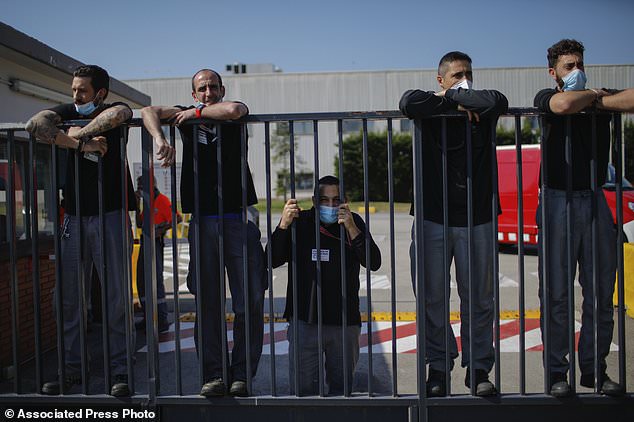

Nissan workers gather during a protest in Barcelona, Spain, on Thursday morning
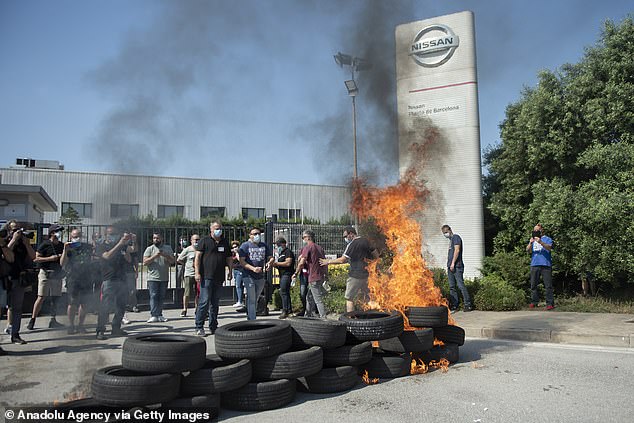

Protester burned a barricade of tyres during outside the Nissan manufacturing plant in Spain
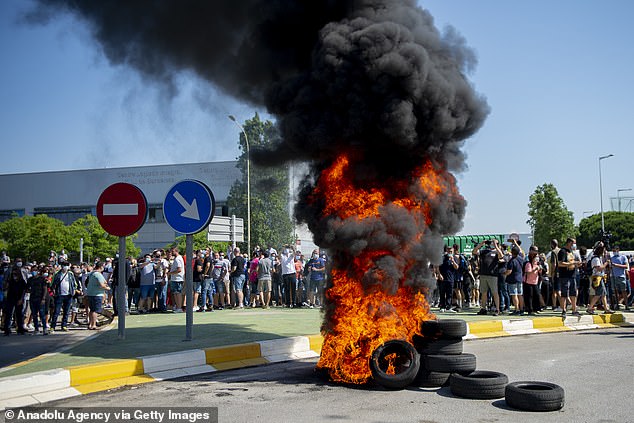

The news comes at the expense of Nissan’s Spanish manufacturing plants in the northeastern Catalonia region, which is predicted to result in the loss of some 3,000 direct jobs in the area.
The Nissan Motor Ibérica plant currently produces the Navara, NV200 and electric e-NV200 vans, as well as the Renault Alaskan pick-up sold in mainland Europe.
Hundreds of workers burning tyres and shouting ‘war’ blockaded Nissan Motor Company’s Barcelona plant on Thursday after the Japanese carmaker announced it would shut it from December as part of a global restructuring plan to slash costs.
Spain’s Industry Ministry says in a statement on Thursday that it regrets the company’s decision despite proposals to keep the plant running, and urges the car manufacturer’s executives to consider alternatives.
Workers’ unions had warned that 20,000 more jobs in Nissan’s local supply chain would also be threatened if the company closed its car manufacturing plant in Barcelona and two smaller factories in nearby towns.
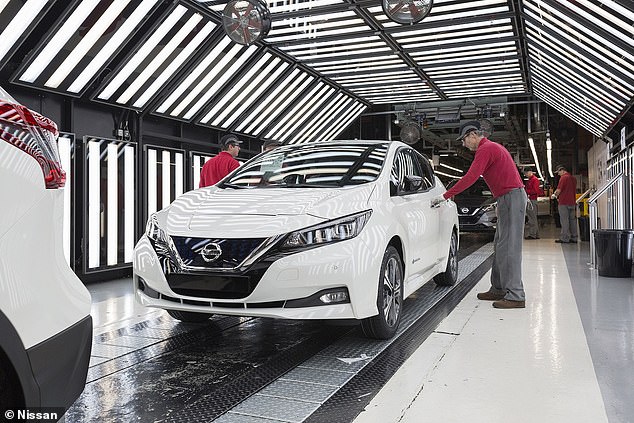

Nissan Sunderland currently produces the Qashqai and Juke SUVs as well as the electric Leaf (pictured)
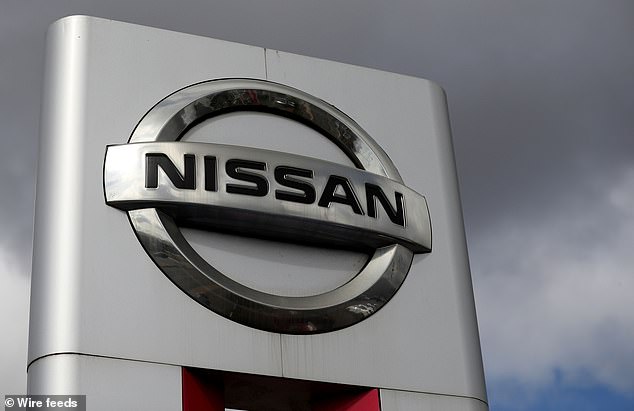

Renault owns just over 40% of Nissan’s shares, and the two companies operate a strategic alliance
Nissan Motor Company reported Thursday a 671.2billion yen ($6.2billion) loss for the fiscal year ended in March, its first annual loss since the aftermath of the financial crisis in the year ending in March 2009.
Yokohama-based Nissan had recorded a 319.1billion yen profit the previous fiscal year through March 2019.
Nissan said its global vehicle production dropped 62 per cent in April to 150,388 vehicles from a year ago. Global vehicle sales slipped nearly 42 per cent last month.
Its sales for the fiscal year ended in March sank nearly 15 per cent to 9.9trillion yen ($91.6billion).
‘The future remains unclear and it is extremely hard to predict,’ Uchida said.
Nissan had spent much of the past year seeking to patch up its tarnished reputation, damaged by the November 2018 arrest of former chairman Carlos Ghosn over financial misconduct allegations, including under-reporting future compensation and misusing Nissan money.
The coronavirus outbreak came on top of such woes.
Uchida acknowledged Nissan was not yet able to give a financial projection for this fiscal year through March 2021.
But he said financing had been secured and various measures to cut costs were underway, and the company will reshape its operations to restore profitability.

